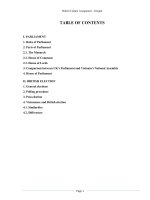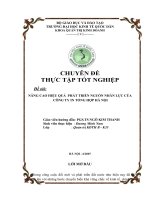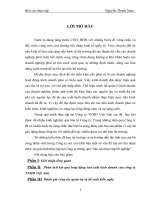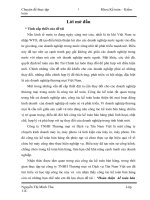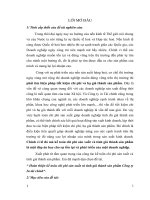Parliament & Election in UK.docx
Bạn đang xem bản rút gọn của tài liệu. Xem và tải ngay bản đầy đủ của tài liệu tại đây (972.95 KB, 17 trang )
British Culture Assignment - Group4
TABLE OF CONTENTS
I. PARLIAMENT
1. Roles of Parliament
2. Parts of Parliament
2.1. The Monarch
2.2. House of Commons
2.3. House of Lords
3. Comparison between UK’s Parliament and Vietnam’s National Assembly
4. House of Parliament
II. BRITISH ELECTION
1. General elections
2. Polling procedure
3. Post-election
4. Vietnamese and British election
4.1. Similarities
4.2. Differences
PARLIAMENT AND ELECTION IN
THE UNITED KINGDOM
I. PARLIAMENT
1. Roles of Parliament
Parliament is an essential part of UK politics. Its main roles are:
Examining and challenging the work of the government
Page 1
British Culture Assignment - Group4
Debating and passing all laws. Parliament is responsible for approving new laws
Enabling the government to raise taxes.
2. Parts of Parliament
Parliament is the highest legislative authority in the United Kingdom. Made up of the House of
Commons, House of Lords and the Queen (who is the UK's current hereditary monarch).
The Monarch, the Queen, opens and closes Parliament every year, asks the winning party in a
general election to become the government and officially signs all the laws that Parliament votes for.
The House of Commons is made up of 650 Members of Parliament (MPs). People vote for
their MPs and whoever wins represents everyone in their local area (called a constituency) even if
they voted for someone else.
The House of Lords has 840 members, who are not elected but who have been selected by the
prime minister and appointed by the Queen.
2.1. The Monarch
The monarchy is the oldest part of the system of government in this country. Time has reduced
the power of the monarchy, and today it is broadly ceremonial. The Queen plays an essential role in
opening and dissolving Parliament and approving Bills before they become law.
2.1.1. Incumbent: Elizabeth II (Elizabeth Alexandra Mary)
2.2.2. Roles
The Crown is an integral part of the institution of Parliament
Appointing a government
The day after a general election the Queen invites the leader of the party that won the most seats in
the House of Commons to become Prime Minister and to form the government.
Opening and dismissing Parliament
The Crown opens Parliament through the State Opening (marking the beginning of the Parliamentary
year). The Crown dismisses Parliament before a general election at the request of the Prime Minister
(dissolution).
Queen's Speech
Page 2
British Culture Assignment - Group4
The Crown informs Parliament of the government's policy ideas and plans for new legislation in a
speech delivered from the throne in the House of Lords. Although the Queen makes the speech, the
government draws up the content.
Royal Assent
When a Bill has been approved by a majority in the House of Commons and the House of Lords it is
formally agreed to by the Crown. This is known as the Royal Assent. This turns a Bill into an Act of
Parliament, allowing it to become law in the UK.
2.2. House of Commons
Full, formal title: The Honourable the Commons of the United Kingdom of Great Britain
and Northern Ireland in Parliament assembled.
2.2.1. History of House of Commons
The House of Commons of England evolved in England during the 14th century and, in practice, has
been in continuous existence since, becoming the House of Commons of Great Britain after the political union
with Scotland, during the nineteenth century, of the United Kingdom of Great Britain and Ireland after the
political union with Ireland, finally reaching its current title after independence was given to the Irish Free
State in 1922.
The House of Commons was originally far less powerful than the House of Lords, but today its
legislative powers greatly exceed those of the Lords. Moreover, the Government is primarily
responsible to the House of Commons; the prime minister stays in office only as long as he or she
retains its support.
Page 3
British Culture Assignment - Group4
2.2.2. Members of Parliament (MPs)
a) The leadership
Speaker: John Bercow
Leader: Sir George Young (Conservative)
Shadow Leader: Hillary Benn (Labour)
b) The members
The Commons is publicly elected. The party with the largest number of members in
the Commons forms the government.
They hold their seats until Parliament is dissolved (a maximum of five years after the
preceding election).
After the General Election 2010, there were 650 MPs elected. Due to the resignation of
Mr Gerry Adams on 26 January 2011 and the death of David Cairns on 9 May 2011 there are
currently 648 MPs.
2.2.3. Roles
a) Relationship with the government
By convention, the prime minister is answerable to, and must maintain the support of the House
of Commons. And the prime minister is always a member of the House of Commons, rather than the
House of Lords. The prime minister chooses the Ministers, and may decide to remove them at any
time; the formal appointment or dismissal, however, is made by the Sovereign.
The House of Commons scrutinizes the Government through "Question Time", during which
members have the opportunity to ask questions of the prime minister and of other cabinet ministers.
Prime minister's question time occurs once each week, normally for a half-hour each Wednesday.
Questions must relate to the responding minister's official government activities, not to his or her
activities as a party leader or as a private Member of Parliament. Customarily, members of the
Government party and members of the Opposition alternate when asking questions.
Page 4
British Culture Assignment - Group4
b) Legislative functions
Bills may be introduced in either House, though controversial bills normally originate in the
House of Commons. The supremacy of the Commons in legislative matters is assured by the
Parliament Acts.
All legislation must be passed by the House of Commons to become law and it controls taxation and the
supply of money to the government. Government ministers (including the Prime Minister) must regularly
answer questions in the House of Commons and there are a number of select committees that scrutinize
particular issues and the workings of the government. There are also mechanisms that allow members of the
House of Commons to bring to the attention of the government particular issues affecting their constituents.
2.3. House of Lords
Full, formal title: The Right Honourable the Lords Spiritual and Temporal of the United Kingdom
of Great Britain and Northern Ireland in Parliament assemble.
2.3.1. Members of House of Lords (Peers)
a) The leadership
Lord Speaker: Baroness D'Souza
Leader: Lord Strathclyde (Conservative)
Opposition Leader: Baroness Royall of Blaisdon (Labour)
b) The members
The Lords currently has around 830 Members, and there are three different types: life Peers,
bishops and elected hereditary Peers. Unlike MPs, the public do not elect the Lords. The majority are
appointed by the Queen on the recommendation of the Prime Minister or of the House of Lords
Appointments Commission.
Life Peers: Appointed for their lifetime only, these Lords' titles are not passed on to their
children. The Queen formally appoints life Peers on the advice and recommendation of the
Prime Minister.
Page 5
British Culture Assignment - Group4
Archbishops and bishops: A limited number of 26 Church of England archbishops and
bishops sit in the House, passing their membership on to the next most senior bishop when
they retire. The Archbishops of Canterbury and York traditionally get life peerages on
retirement.
Elected hereditary Peers: The right of hereditary Peers to sit and vote in the House of Lords
was ended in 1999 by the House of Lords Act but 92 Members were elected internally to
remain until the next stage of the Lords reform process.
2.3.2. Roles
a) Relationship with the Government
The House of Lords does not control the term of the Prime Minister or of the Government. Only
the Lower House may force the Prime Minister to resign or call elections by passing a motion of no-
confidence or by withdrawing supply. Thus, the House of Lords' oversight of the government is
limited.
The House of Lords remains a source for junior ministers and members of government. Like the
House of Commons, the Lords also have a Government Chief Whip as well as several Junior Whips.
Where a government department is not represented by a minister in the Lords or one is not available,
government whips will act as spokesmen for them.
b) Legislative functions
The House of Lords debates legislation, and has power to amend or reject bills. However, the
power of the Lords to reject a bill passed by the House of Commons is severely restricted by the
Parliament Acts. Under those Acts, certain types of bills may be presented for the Royal Assent
without the consent of the House of Lords (i.e. the Commons can override the Lords' veto).
The House of Lords cannot delay a money bill (a bill that, in the view of the Speaker of the
House of Commons, solely concerns national taxation or public funds) for more than one month.
Other public bills cannot be delayed by the House of Lords for more than two parliamentary sessions,
or one calendar year.
Page 6
British Culture Assignment - Group4
2.4. Comparison between House of Commons and House of Lords
HOUSE OF COMMONS
HOUSE OF LORDS
Working place
House of Parliament. (Westminster Palace)
Roles
Legislating, supervising the work of Government.
Members
- Members of Parliament (MPs)
- From all walks of life
- Elected by the people
- Peers
- Upper class, royal…
- Appointed by the Queen
Relationship with Government
- The prime minister is always a member of the House of Commons.
- Have right to scrutinize the Government.
- The House of Lords' oversight of the government is limited.
- The House of Lords does not control the term of the Prime Minister or of the Government.
Power
- Legislative powers greatly exceed those of the Lords.
Page 7
British Culture Assignment - Group4
- Certain types of bills may be presented for the Royal Assent without the consent of the House
of Lords
- Be restricted to reject a bill passed by the House of Commons.
- May not amend any Supply Bill.
- Held several judicial functions.
Page 8
